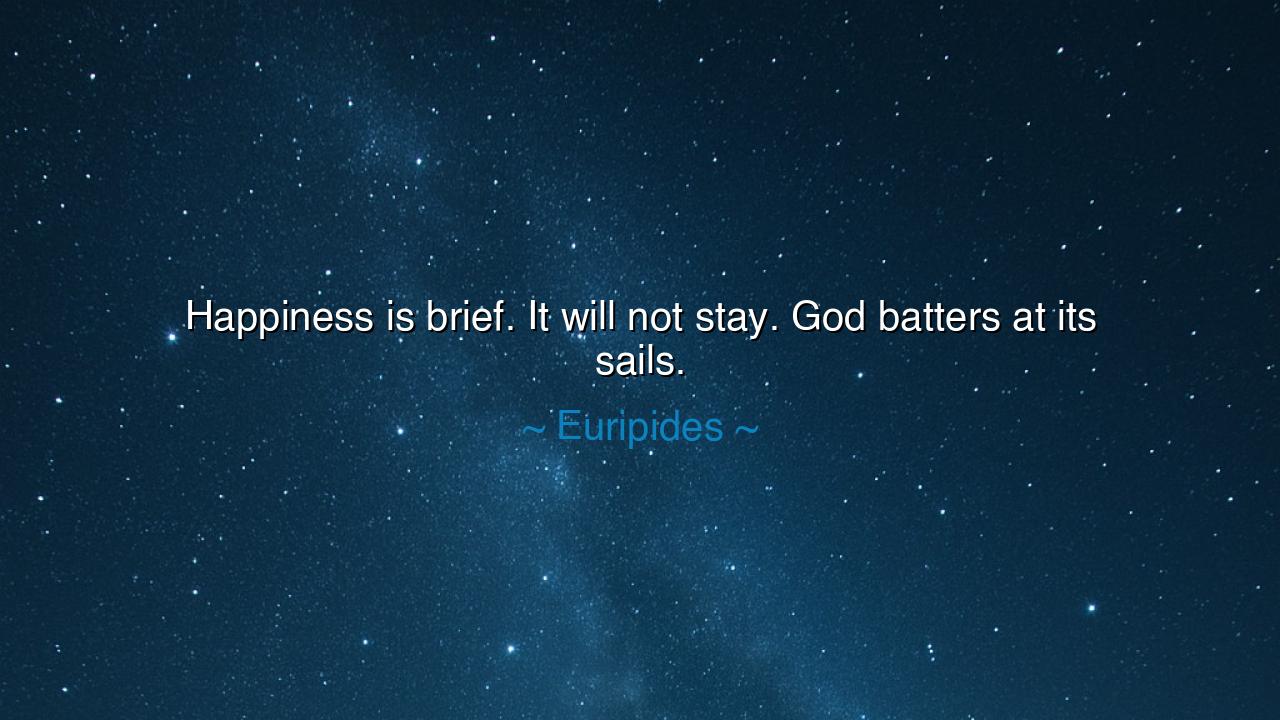
Happiness is brief. It will not stay. God batters at its sails.






In the haunting words of Euripides, the ancient tragedian whose pen carved truth from the heart of sorrow, we hear this lament of the human condition: “Happiness is brief. It will not stay. God batters at its sails.” These words, written more than two thousand years ago, rise like a wind through the centuries — a wind that still shakes the hearts of men. They speak of the fragility of joy, of how even in moments of sunlight, the shadow of impermanence stands close behind. To live, Euripides tells us, is to voyage upon a sea where calm waters are never permanent, and where the divine — or fate itself — forever tests the strength of our sails.
The origin of this quote lies in the tragic wisdom of ancient Greece, a civilization that understood life not as a steady climb toward happiness, but as a balance between fortune and fate. Euripides, like his fellow dramatists Sophocles and Aeschylus, saw human life as a fragile vessel drifting upon divine tides. The gods — or the forces beyond human control — were not cruel, but unrelenting. They did not permit mortals to remain in joy for long, for unending happiness would make them forget humility, forget gratitude, forget that life itself is a fleeting gift. Thus, when Euripides says, “God batters at its sails,” he reminds us that even joy must be tested, so that the soul may learn endurance and wisdom.
In this saying lies not despair, but a hard and sacred truth: happiness is not meant to be permanent, because it is not the final purpose of life. To the ancients, the highest good was not endless pleasure, but understanding — to know the cycles of existence, to accept the rise and fall of all things. Happiness, they believed, is like a bright dawn upon the sea: beautiful, yet fleeting, and all the more precious because it does not last. The wise man does not curse the storm that follows, for he knows it is the nature of the world that calm and tempest share the same sky.
Consider the tale of King Priam of Troy. In his youth, he ruled a prosperous city, surrounded by sons and glory. Yet when the winds of fate turned, those same gods who had favored him sent the Greeks to his gates. His sons were slain, his city burned, and in his old age, he was forced to kneel before his enemy to beg for the body of Hector. Yet even in that sorrow, there was dignity — a recognition that joy and suffering are not enemies, but twin threads in the fabric of human destiny. Priam’s happiness was brief, yet his nobility of spirit endured. In his ruin, he became more deeply human — and perhaps, more divine.
Euripides does not bid us reject happiness, but to revere it wisely. To cling to joy as though it will last forever is to invite heartbreak; to shun it out of fear of loss is to deny the sweetness of living. The true art of life lies in sailing with open eyes — to rejoice when the winds are fair, but to hold fast when the storms come. For every joy carries within it the seed of change, and every sorrow carries the promise of renewal. Thus, the gods who batter our sails do not seek to destroy us, but to make us stronger navigators of the soul.
In the story of Anne Frank, centuries after Euripides wrote, we find this same eternal truth. In a time of fear and oppression, a young girl confined in hiding wrote of her love for life, of her belief in goodness despite the darkness around her. Her happiness, fragile and brief, was battered by forces beyond her control. Yet her words endure — a testament to the truth that even when joy is fleeting, the courage to hope transforms suffering into light. She could not keep happiness, but she preserved meaning — and in that, she triumphed over despair.
So, my child, learn from this wisdom of the ancients: do not mourn the brevity of happiness, but honor it. When joy comes, drink deeply, for it is a gift. When sorrow arrives, stand firm, for it too is a teacher. Know that the same wind that batters your sails also propels you forward. The gods do not destroy those who endure; they forge them into beings of resilience and depth. Therefore, live not in fear of the storm, but in gratitude for the voyage. For happiness may be brief, but the strength and wisdom born of its loss are eternal — and through them, your spirit shall reach the farthest shores of the soul.






AAdministratorAdministrator
Welcome, honored guests. Please leave a comment, we will respond soon